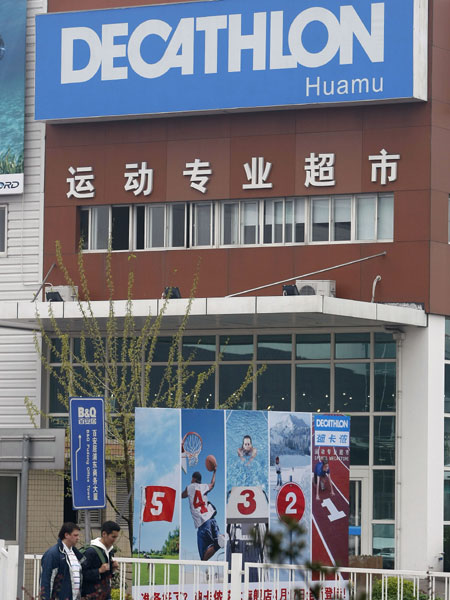
Decathlon, the French sports goods chain, is to triple its Chinese store numbers and make the country its third-largest global market.
|
 |
|
A Decathlon store in Shanghai. [Photo/China Daily] |
Bertrand Tison, vice-president of Decathlon China, said the firm is targeting 150 stores on the Chinese mainland by the end of 2015, with most being planned in second- or third-tier cities.
Founded in 1976 in France, Decathlon opened its first store on the Chinese mainland in 2003 and now has 46 outlets.
"Around a third of our China sales come from first-tier city stores, but in the future, smaller cities will be the drivers of our growth," added Tison.
Industry experts consider that Decathlon - which has more than 600 stores worldwide - has developed slowly in China mainly because it has found it hard to find suitably cheap sites for its large-store format.
Tison said China is now its fourth-largest market after France, Spain and Italy, but plans to move that to its third in the next five years.
Guo Hongchi, chief executive of xijie.com, a leading e-commerce portal for sports goods, said: "Around 90 percent of Decathlon items are self-branded. Many of its products are between a third and a quarter the price of international counterparts, but with almost the same quality.
That makes it very competitive in smaller Chinese cities.
Another outstanding strength is its focus on giving shoppers a lifestyle experience, rather than just a shop where they can spend their money, he said
Decathlon stores generally cover large areas of around 4,000 square meters. They have shop-front basketball courts, for instance, and other "experiences" include similar areas for badminton, soccer and ping-pong, where customers can play in-store for free.
Its largest Chinese store is in Beijing, covering an area of nearly 6,000 square meters.
Guo Zengli, president of China Shopping Center Development Association of Mall China, said he thinks the company has a good future in China, because of its "careful market research and high requirements on the location of stores".
He added: "Its planned 150 stores in China is not enough, as there's still a lot of room in lower-tier Chinese cities, which international sports brands have still to penetrate."
liwoke@chinadaily.com.cn